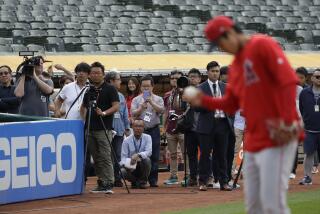Japanese Women Find a Model in Hillary Clinton
- Share via
TOKYO — When First Lady Hillary Rodham Clinton stepped off Air Force One with her husband and approached a line of waiting limousines here Tuesday, a Japanese reporter wrote disapprovingly that “she gestured as if to say in a wife-leading-the-husband-manner, ‘That’s your car and this is mine.’ ”
The comment was telling, both about Japanese attitudes toward Mrs. Clinton before her arrival and about the current state of this country’s attitudes toward women. In Japan, Mrs. Clinton was seen in almost legendary proportions as the tough, pushy superwoman who became co-President of the United States.
But when a group of prominent Japanese women actually got a chance to talk to her over lunch Wednesday, they said they were pleasantly surprised.
“The media makes her out to be scary but she is very fresh and unpretentious,” one of the lunch guests, free-lance writer Charmin Koda, told a television interviewer.
“She is charming, very attractive and incredibly bright,” said another guest, Mitsuko Shimomura, a senior reporter and author at the Asahi newspaper. “She was interested in political change in Japan and she was a good listener.”
Shimomura expressed disappointment that more Japanese will not have a chance to see and hear from her. “I think it would be better for her to talk openly to everybody the way she talked to us,” she said.
“Japanese men are a little frightened because they think she is taking over Clinton’s job even though she wasn’t elected,” Shimomura added. “She isn’t that way at all; she was very relaxed.”
While men may have a negative view of Mrs. Clinton, she is a model to many Japanese women. She is frequently compared to Princess Masako, who last month gave up her career as a diplomat to marry Crown Prince Naruhito.
“We were excited about Masako because it was the first time for a professional woman to marry the crown prince,” said Shimomura.
When a Japanese newspaper recently asked college women to name their model women, at the top of the list was Princess Masako, next were working mothers, third was a popular television anchorwoman and fourth was none other than Mrs. Clinton.
“Her coming to Japan will have a great impact on young women who are trying to do things in Japan,” said Hiroko Nakamura, a pianist who also attended the lunch. “She shows there are all kinds of possibilities for women.”
Mrs. Clinton is popular in spite of frequent reports portraying her as the archetypal overachieving, bossy American woman. Everybody here knows the tale about how daughter Chelsea once told a school nurse to call her father when she was sick because her mother was busy.
Wide credence is also given to Mrs. Clinton’s quip when asked whether she would have ended up the wife of a gas station attendant if she had married an earlier boyfriend: The boyfriend might have become President, she replied.
In Japanese culture, such a comment would suggest arrogance, even though many prominent Japanese men undoubtedly are also driven to achieve by strong women.
Perhaps the most damaging article was in the June issue of the widely respected monthly magazine Bungei Shunju entitled, “Hillary-style Japan bashing has begun. Empress Hillary in the shadows of the high yen.”
The article, written by a Japanese lawyer living in America, described Mrs. Clinton as more powerful than Britain’s Queen Elizabeth II and compared her power to that of Jiang Qing, wife of Chinese Communist Party Chairman Mao Tse-tung, during the Cultural Revolution. The article even suggested that Mrs. Clinton had something to do with America’s decision to try to talk up the value of the yen.
In conclusion, it warned Japanese men that they now must not only be careful about making racist statements but also should be on guard against saying anything against women.
The magazine’s editor, Hiroshi Shirakawa, said the author’s views do not necessarily reflect widespread views in Japan, but the magazine published it because “America is the only superpower and she is the First Lady. Barbara Bush stayed in the shadows but she (Mrs. Clinton) is up front.”
Perhaps because of such attitudes, Hillary Rodham Clinton’s role has been deliberately played down during her Tokyo visit. U.S. Embassy officials say they suggested ways in which Mrs. Clinton might have interacted more with the Japanese public but were told that her schedule should be what is scheduled for the other spouses of leaders attending the Group of Seven summit.
That means she spent Wednesday in Japan’s rather unimpressive Tokyo National Museum looking at Japanese antiquities. And today, she and other summit spouses are visiting a waste treatment plant to hear about Tokyo’s garbage problem, an issue that is widely regarded in Japan as a suitable concern for housewives.
More to Read
Sign up for Essential California
The most important California stories and recommendations in your inbox every morning.
You may occasionally receive promotional content from the Los Angeles Times.













